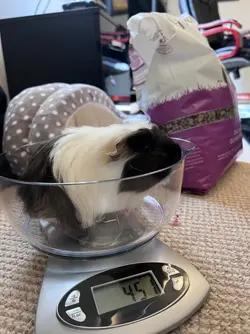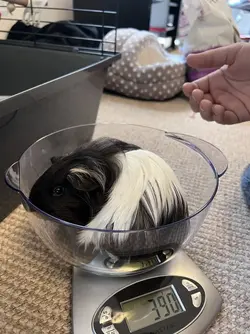Hello all, we had to do piggie bowl time to weigh our two girls today, we are new to this and a lot of things I have read say they are overweight for their age (11 weeks) is this true and should I cut down their food? Thankyou


Hi and welcome
Please throw away any weight charts right now because they are an entirely arbitrary human measurement and when used to starve healthy piggies just because they do not fall in the 5% right on the middle line or because they fall into the 50% that by mathematical definition (and no other reason) fall outside the 'average' group as to big or small. 'Not average' is unfortunately far too often misunderstood as 'not normal', and that is where well meant but unwitting abuse can take off from.
Babies can weigh between 40g and 140g at birth and that reflects in their weight as they grow on; adult guinea pigs between 800-1800g can all be a healthy weight in their own right and live a healthy and normal life span. Just because the smallest and the largest quarters do not fall on the line doesn't mean that they are not healthy at all and they won't live as long as 'average' piggies - I have had both piggies from either end of the spectrum live to 8 years of age, just the same as 'average' ones. 'Average' just means that we humans declare half the piggy population as outside the norm because normal natural weight variance in guinea pigs is much wider than human statistical charts allow.
We distinguish between two things when weighing:
- The weight to size ratio ('heft' or BMI): Is my guinea pig a healthy weight for their individual size? You feel this easiest around the ribcage. This gives you the ball park as to whether your piggy is a good weight for their size or whether they are overweight or underweight. Only on this basis becomes regular weekly or daily weighing meaningful. This method works for all shapes, sizes, genders and ages equally and doesn't discriminate between 'average' and 'not average', unlike weight charts.
- Once you know whether your piggy is actually fine in themsleves or not, then the weekly weigh-in will make much more sense and give you an informed feedback.
Because the size difference in newborn pups can differ more than three times, age cannot be used as definition for weight, apart from that at that young age your babies are still in the fast growth phase. If they are overfed, then they will exit this stage simply sooner and start growing in stops and spurts for the following months. More slowly growing youngsters will stay in the nonstop growing stage for longer until they have reached a certain percentage of their ideal genetically determined adult size and weight where they will move on to the stop and spurt growth phase. But your babies are most definitely not overweight because everything they eat at this time is still coverted to growth and not to fat.
The relatively long growth period also means that on the same good diet all babies have a fair chance to realise their individual optimum as adults - and that is genetically determined and not something you can change without veering into the dangerous territory of over- or underweight, just to make a piggy fit into a narrow chart and putting their long-term health at risk for the sake of fitting a flawed concept that fails half of all guinea pigs.
Please take the time to read our weight guide; it tells you what to look for when feeling for the heft, how age changes over a life time, what the weekly weigh-in can tell you and when to act. You will find it very interesting and helpful.
Weight - Monitoring and Management
Key to a long life and good health is a good normal hay/grass based daily diet. Please be aware that veg, pellets and treats all together only replace the supplementary role that wild forage used to have; together they make less than a quarter of what a piggy eats in a day.
Please also take a look at our diet guide. It looks at diet as a whole and at the role that each food group plays in very practical diet. A good diet helps your piggies to optimise their genetic inheritance as they approach adulthood at around 15 months of age (so a very long way to go for your babies yet), keep their personal weight-size ratio in balance and can prolong a normal healthy life span for 1-2 years to take it from the lower end of the average to the upper end or even beyond. If you feed a normal good diet without too many pellets or calorific/high sugar veg and rather use enrichment techniques than treats for fun and bonding, you will find that overweight is actually not an issue.
Long Term Balanced General And Special Needs Guinea Pig Diets
These two links are part of our very helpful and very practical New Owners collection. Our collective over 15 years forum experience with literally tens of thousands of questions as well as own ownership experience going in several cases back half a century have gone into this information resource:
Comprehensive Owners' Practical and Supportive Information Collection
I hope that this helps you?



